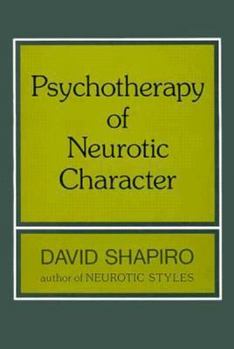Psychotherapy of Neurotic Character
Select Format
Select Condition 
Book Overview
Shapiro's keenness of observation and profound clinical wisdom are once again in evidence, as he brings to bear his brilliant ideas about neurotic character on the actual conduct of psychotherapy. The... This description may be from another edition of this product.
Format:Hardcover
Language:English
ISBN:0465067506
ISBN13:9780465067503
Release Date:March 1989
Publisher:Basic Books
Length:256 Pages
Weight:1.00 lbs.
Dimensions:1.1" x 6.0" x 8.5"
Customer Reviews
2 ratings
Highly readable insights into psychodynamic treatment
Published by Thriftbooks.com User , 17 years ago
David Shapiro is a long time favorite since I read Neurotic Styles as a young clinician. His writing is clear and exciting. He provides numerous in-session transcript excerpts to highlight the language clients use as they distance themselves from their experience. He renders the complexity of the clinical setting into an exciting possibility of discovery and offers well reasoned opinions on the origins of psychopathology (see also Autonomy and Rigid Character). I require this book in my graduate training practicum course. Part theoretical treatise and part inspiration, it is the stuff young (and seasoned) clinicians need to help maintain perspective in our current age of symptom driven manualized treatments. Along with the works of Nancy McWilliams and select others, Shapiro offers access to the insights of psychodynamic/psychoanalytic theory with clear language. This is an essential need in the task of translating the clinical wisdom of so many psychoanalytic thinkers into a form current students can grasp and apply.
A must read for all therapists!
Published by Thriftbooks.com User , 24 years ago
David Shapiro's work has been well known in the field of psychotherapy. His earlier works, Neurotic Styles and Autonomy and Rigid Character, became instant classics as they appeared. In this third book Shapiro delineates his character analytic approach to therapy in the tradition of Helmut Kaiser. Following the theoretical discourse in the first chapter, he explains his major thesis eloquently: the patient him/herself is the therapeutic material. In so doing, Shapiro provides many examples, probably his own as a gifted therapist, that make this book highly readable. I have assigned this book to my interns who are interested in learning the art of therapy. Shapiro is a true master! I highly recommend this book to the readers of this review.





